Hi Guys
Last week I was visiting one of the most impressive sites I have ever had the opportunity to visit, I am referring to the archaeological site of Teotihuacan in the State of Mexico. It is a beautiful and impressive place and the visit is definitely worth it, but let me start at the beginning.
The trip to the site
As it was Sunday we left around 7am to the metro station (yes, there are many other ways to get to the site, but we chose the cheapest one). We went to the Mexico Norte bus station where we bought the bus tickets to take us to the site. This option has the great advantage that you buy a one way ticket for the bus to and from the site. Being students we enjoyed a 50% discount, but even paying the full amount it is a very cheap option. The trip in general lasted 1h, 40min and the bus leave us right in one of the access gate to the arquealogical site.
The Site
The city of teotihuacan its organized around a noth-south axis of aproximately 4km long in form of a central road called " Calzada de los Muertos" (Road of the Deads).
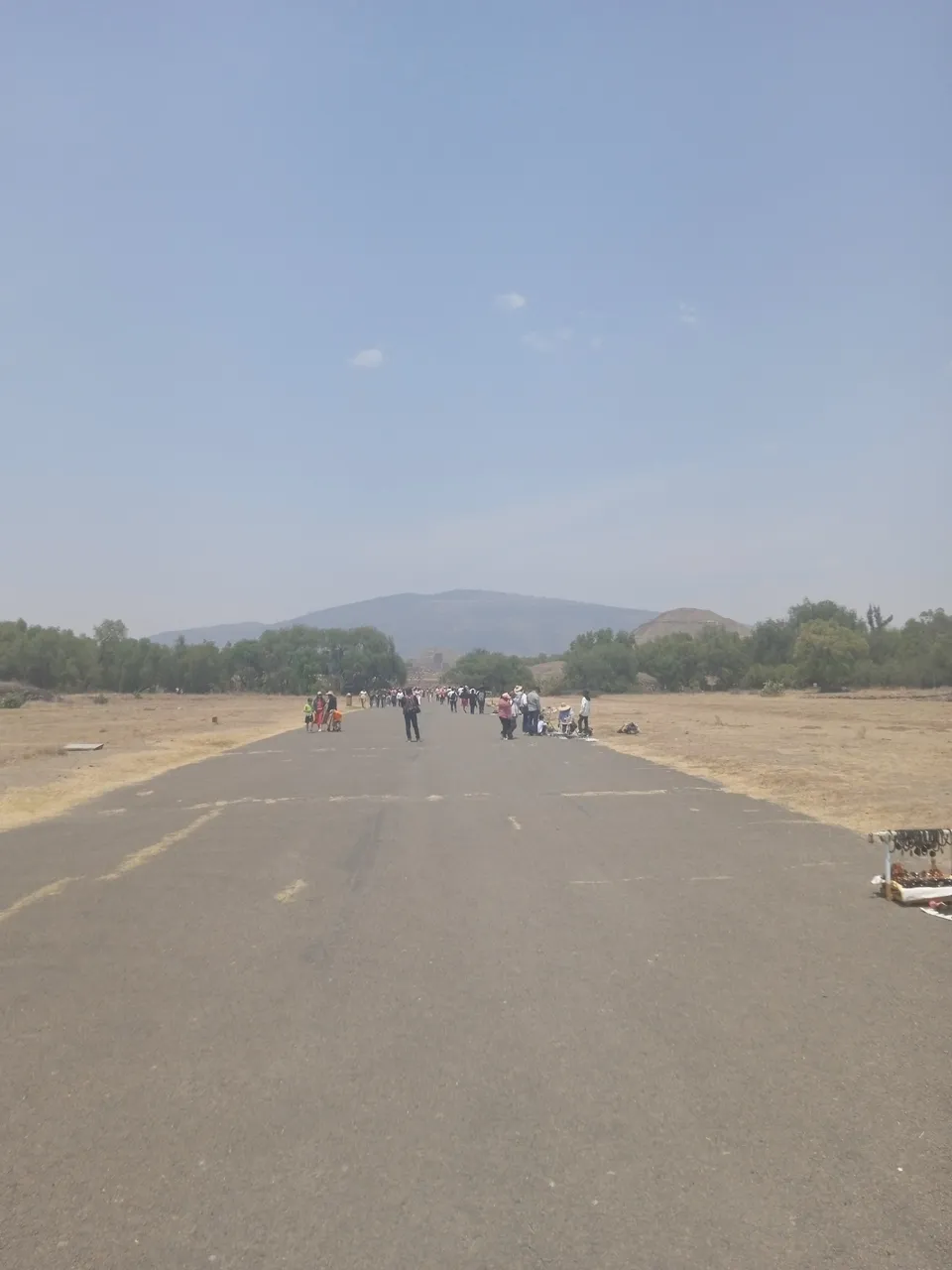
To the north road the Road of the Deads ends in the Moon Square and the south end its still unexplored. In the middle is located ee Pyramide of the Sun and futher south its located th site known as "the Citadel" and the Temple of Quetzalcoatl.
This city its estimated was build during the Ist A.C., which means that these structures are about 1900 years old! To put some context this city was build and inhabited at the same time that the romans were defeated in the Teutoburg forest and this same romans battle and defeat Queen Boudicea consolidating their rulo over Britania. The Teotihuacan people were alive at the same time that the emperors Cesar Augustus, Tiberio, Caligula, Claudius y Nero.
Despite the common beleive, the Teotohuacan people didn´t coexisted with the Mexicas and the city was not build by the late ones. In fact the City was abandoned for at least 800 years before the Mexica culture reach its peak at the Valley of Mexico. What did happens was that the mexicas knew the ruins of the city and were impressed by its magnificence, at the point that they beleived that was built by gods, so they were the ones thet named as we know it today which is Nahuatl for "The Place of Apotheosis". They were so fascinated by this culture that in the Tenochtitlan´s larger temple some objects from Teotihuacan culture were found. Apparently moved by the mixicas almost a millenia later.
The Pyramide of the Sun
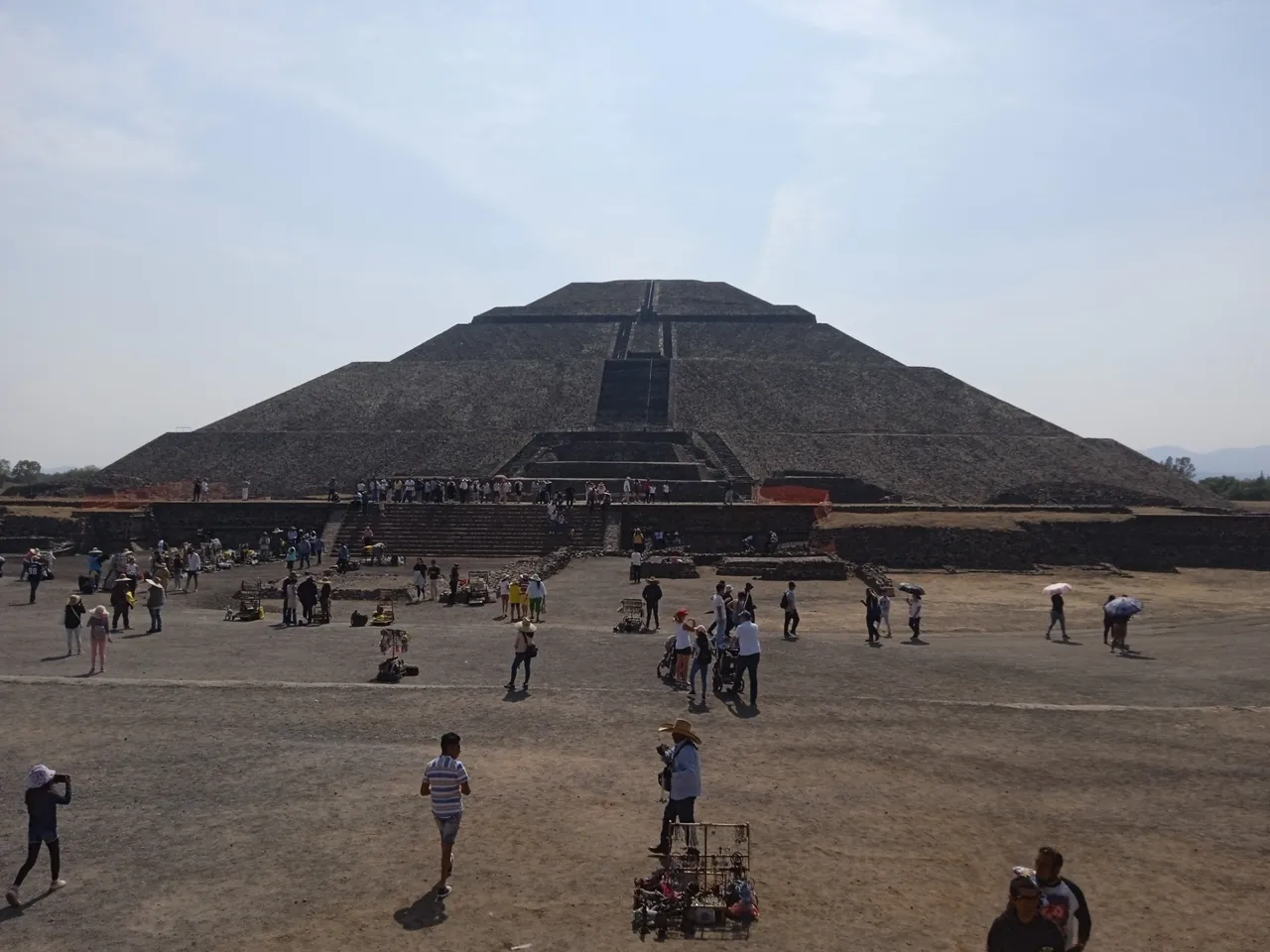
In our case we enter the site by the gate located just in front to the pyramide of the sun, this is a very exceptional location, because the first image you get to the site its of one of the biggest pyramid ever buildt in Middle América, an impossing rock mass that reach up tu 65m hight and that dominates the center of the city. According to the information for turist in spite it is known as "Pyramid of the Sun" the last archealogical findings points to the idea that probably it was actually a temple dedicated to the god of the water (Tláloc for the Mexicas). In past times was possible to climb to the top of the pyramid but now it is forbiden. The base of the pyramid is decorated with stone carvings that depict circular figures and animal heads.
The surroundin archealogical includes several staggered platforms and several housing sites built in stone.
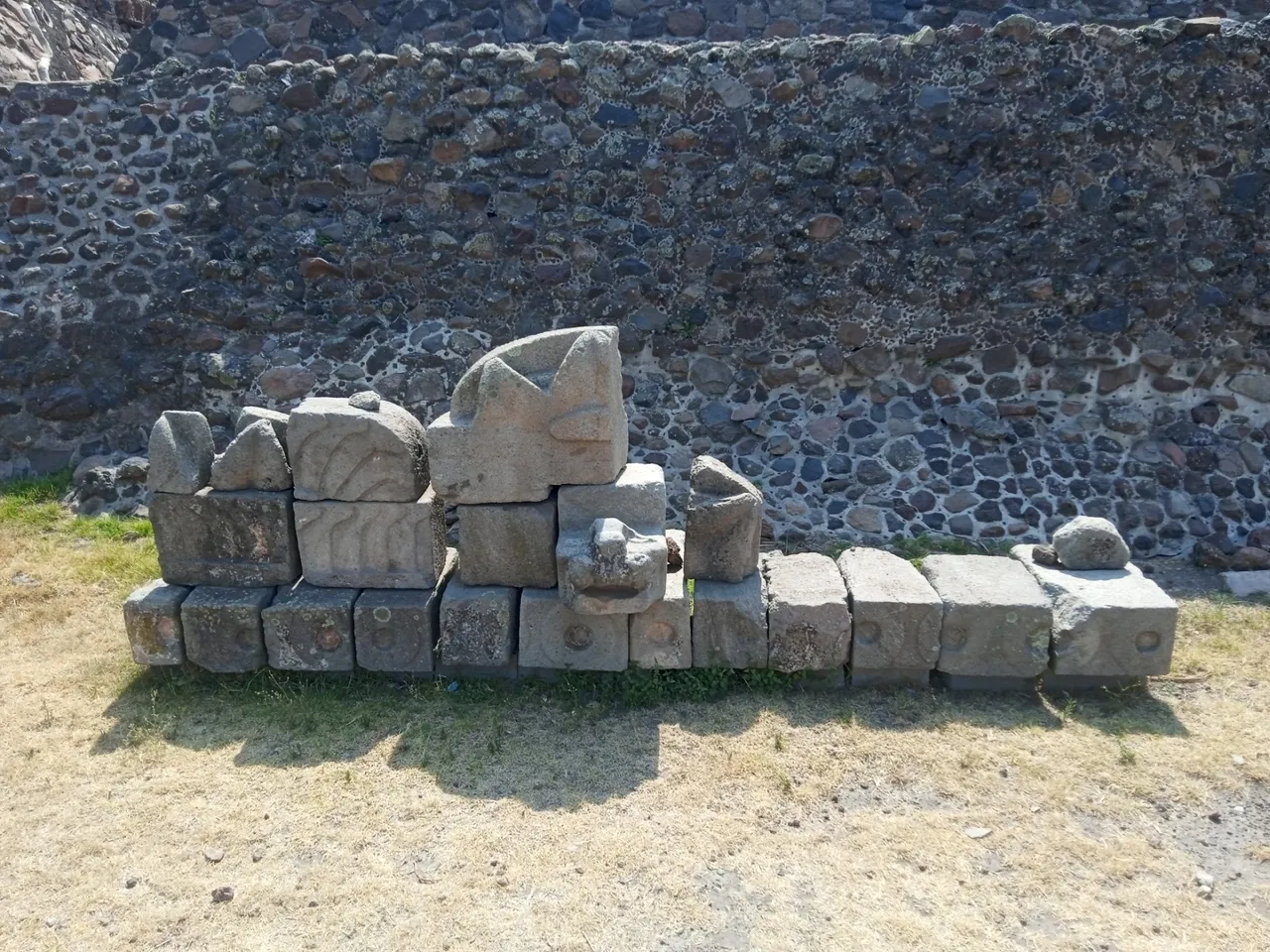
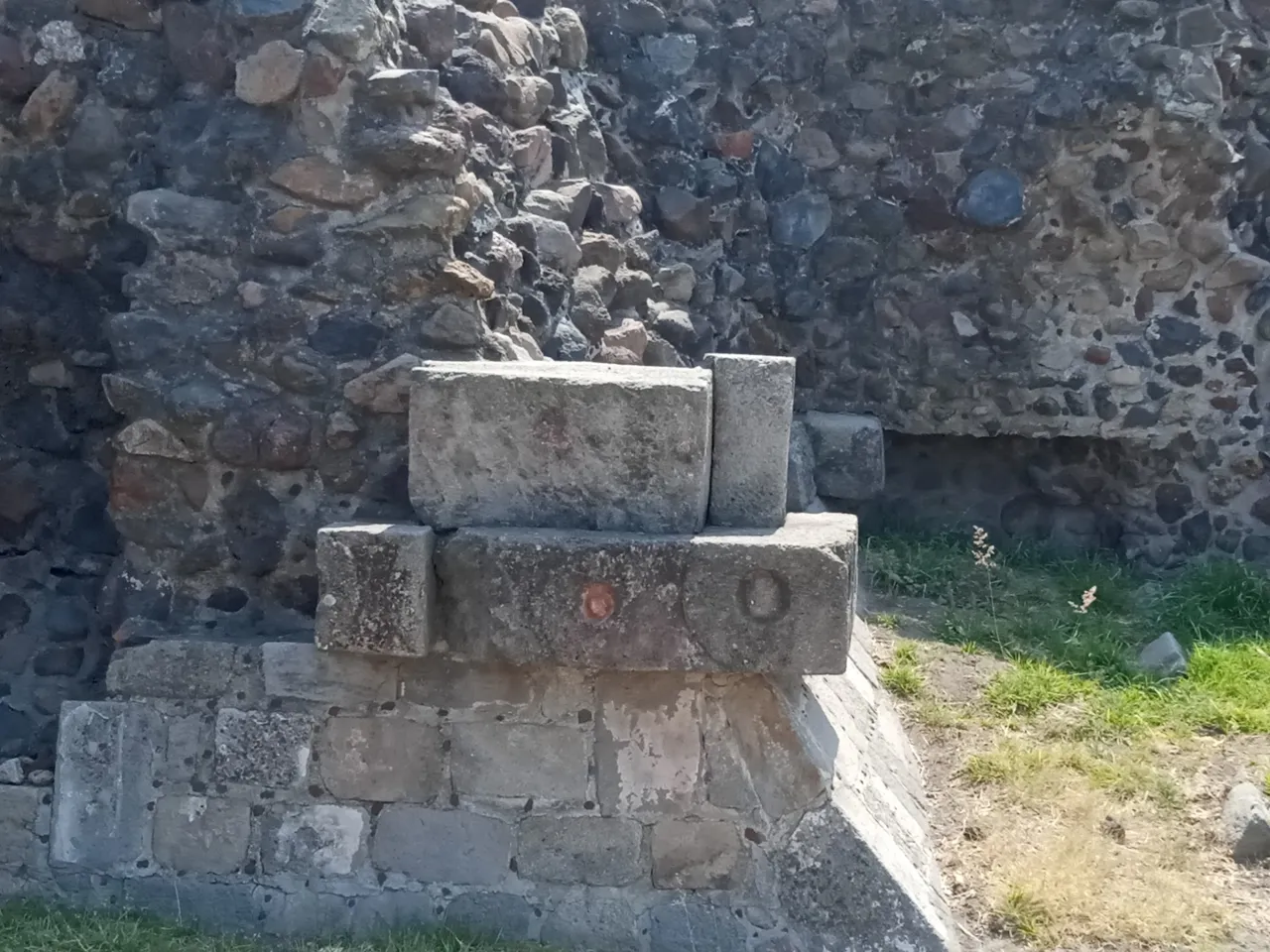
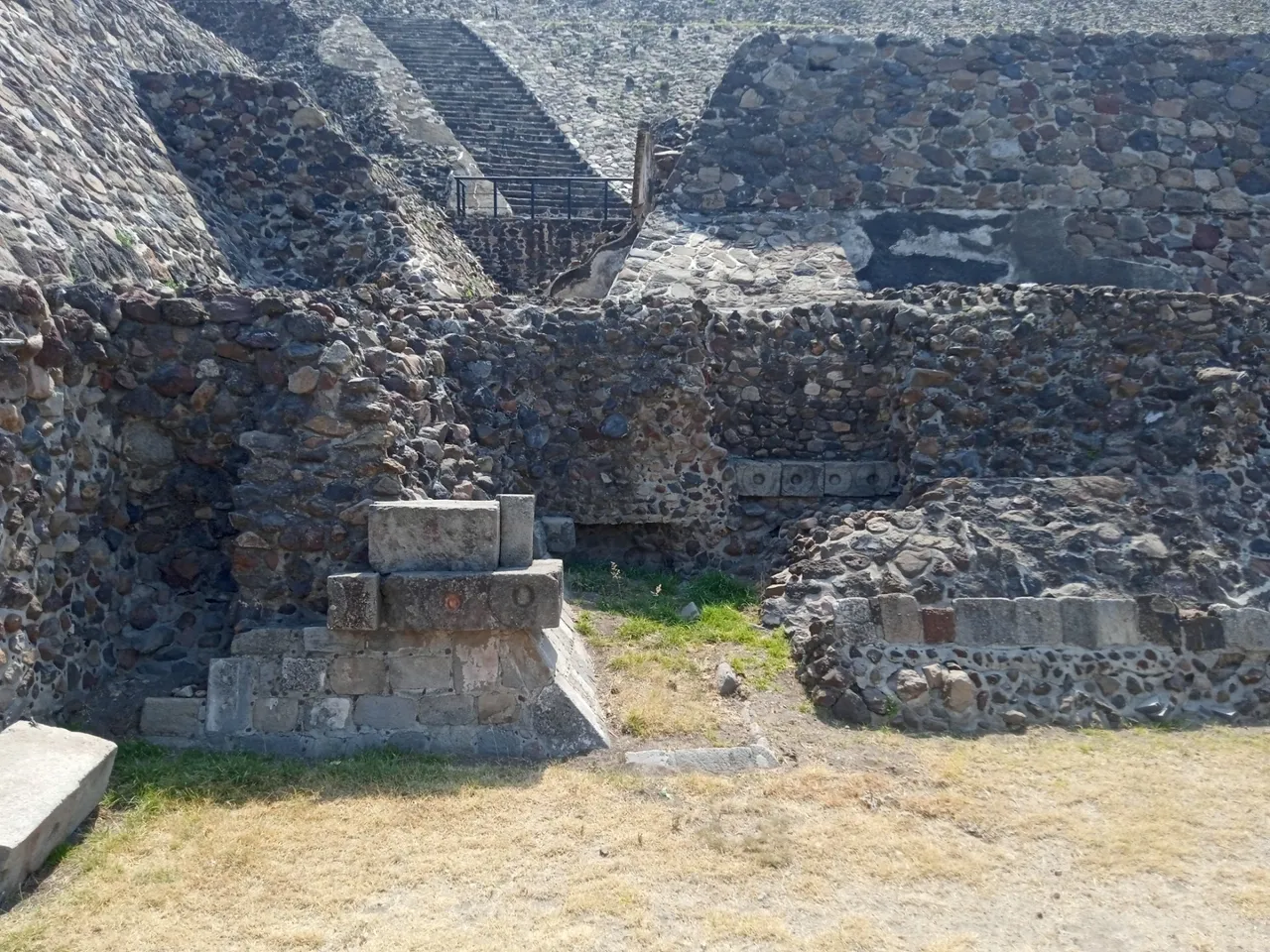


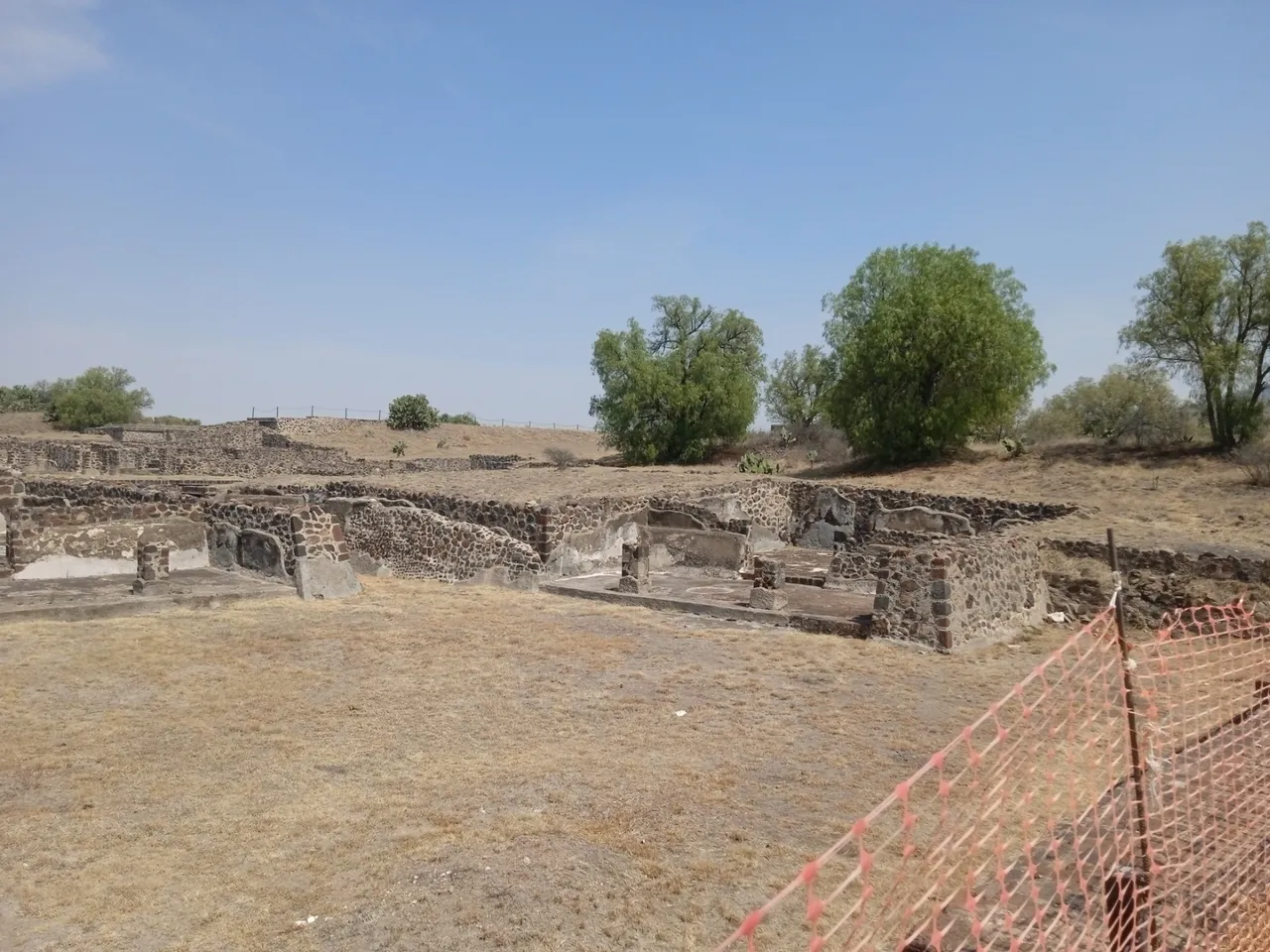
The Moon Square
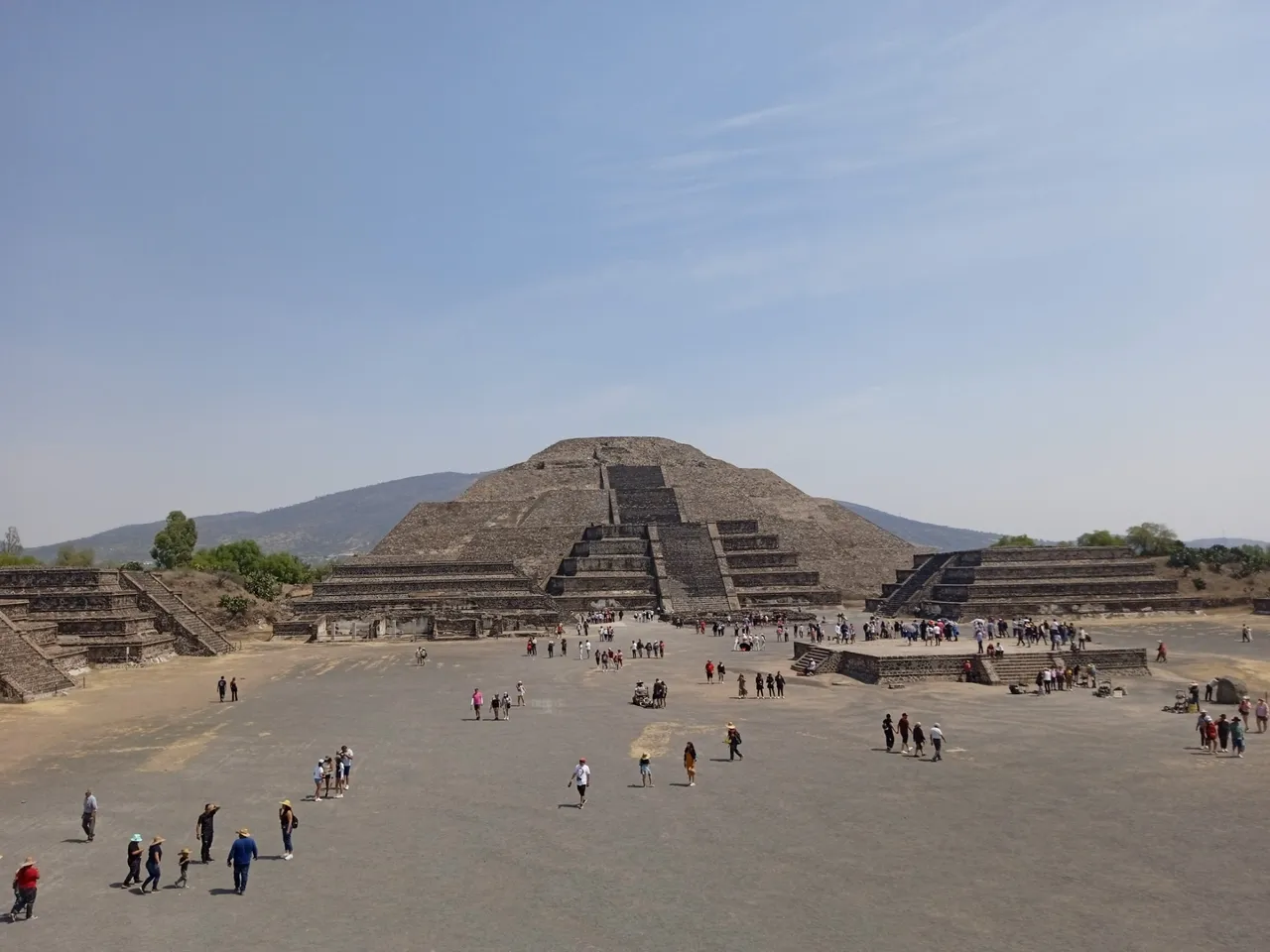
In my view this is the most impressive place on the whole site, despite the pyramide of the moon its not as big and impossing as is the pyramid of the sun, still its a magnificent structure and what makes it very impressive it is that it is not only one pyramide but and entire complex that also includes several smaller staggered platforms and a palace surrounding a central square. Possibly this place once host the great political and religious events of the city, almost 2000 years ago. If you look closely you can almost see the Teotihuacan people standing in the several platforms arround the square, the city leaders presiding over the event from the platform in the pyramide of the moon and some kind of ritual taking place in the platform at the center of the square, all of this while some kind of chant or liturgical music was made. Beeing at this place all it takes is a minimun of imagination to teleport yourself to a very far past.
The palace of Quetzalpapalotl
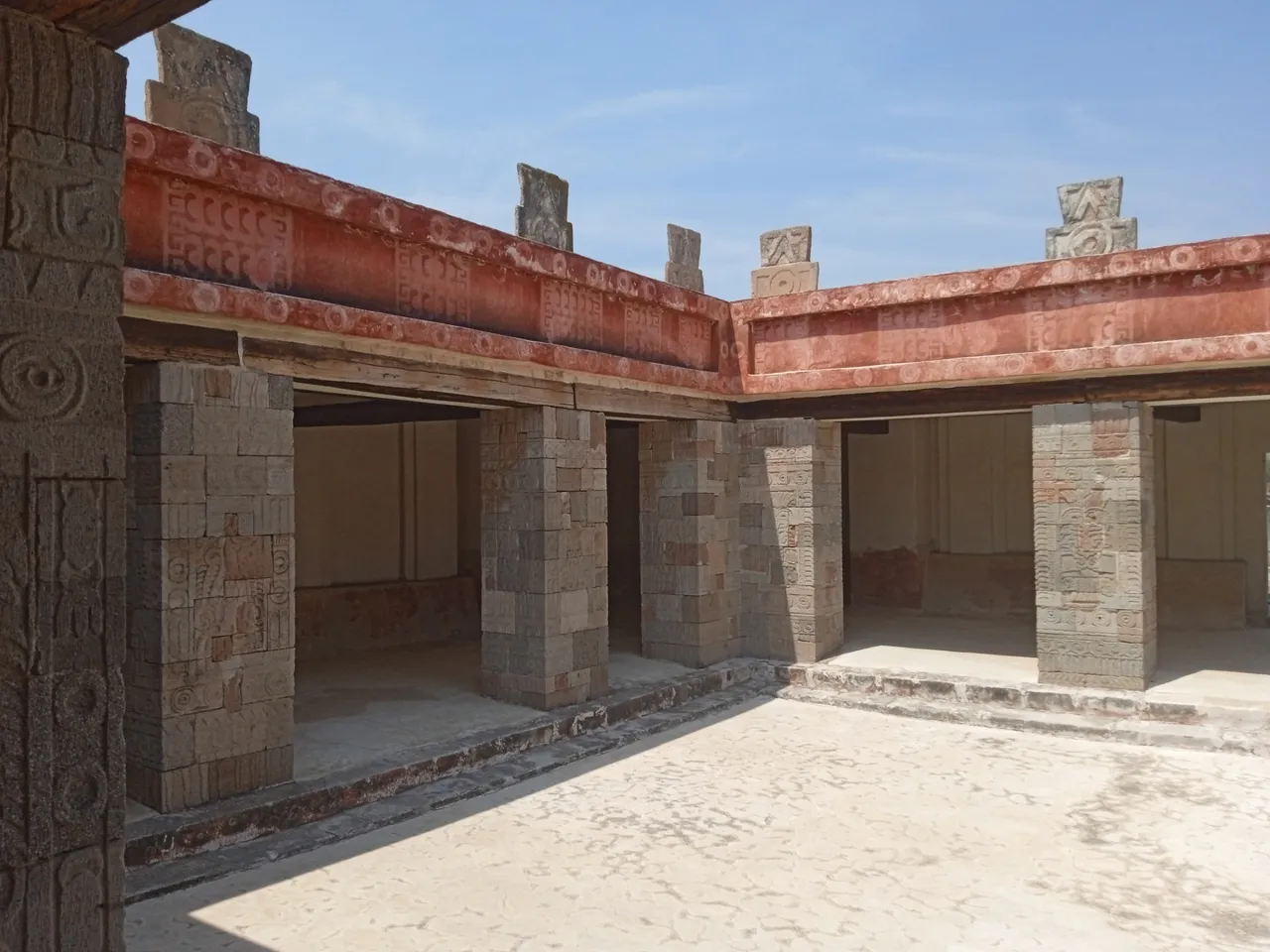
The name of this palace means "Beautiful Butterfly" and was possibly the place of teotihuacan´s royalty. although its not entirely preserved and the access its quite restricted, there are several outstanding elements in the palace.
The columns surrounding the central yard are decorated by very beautiful and quite detailed engravins in the columns and merlons. An impressive red paint still covers the lintels afther thousands of years (probably cochineal grana).

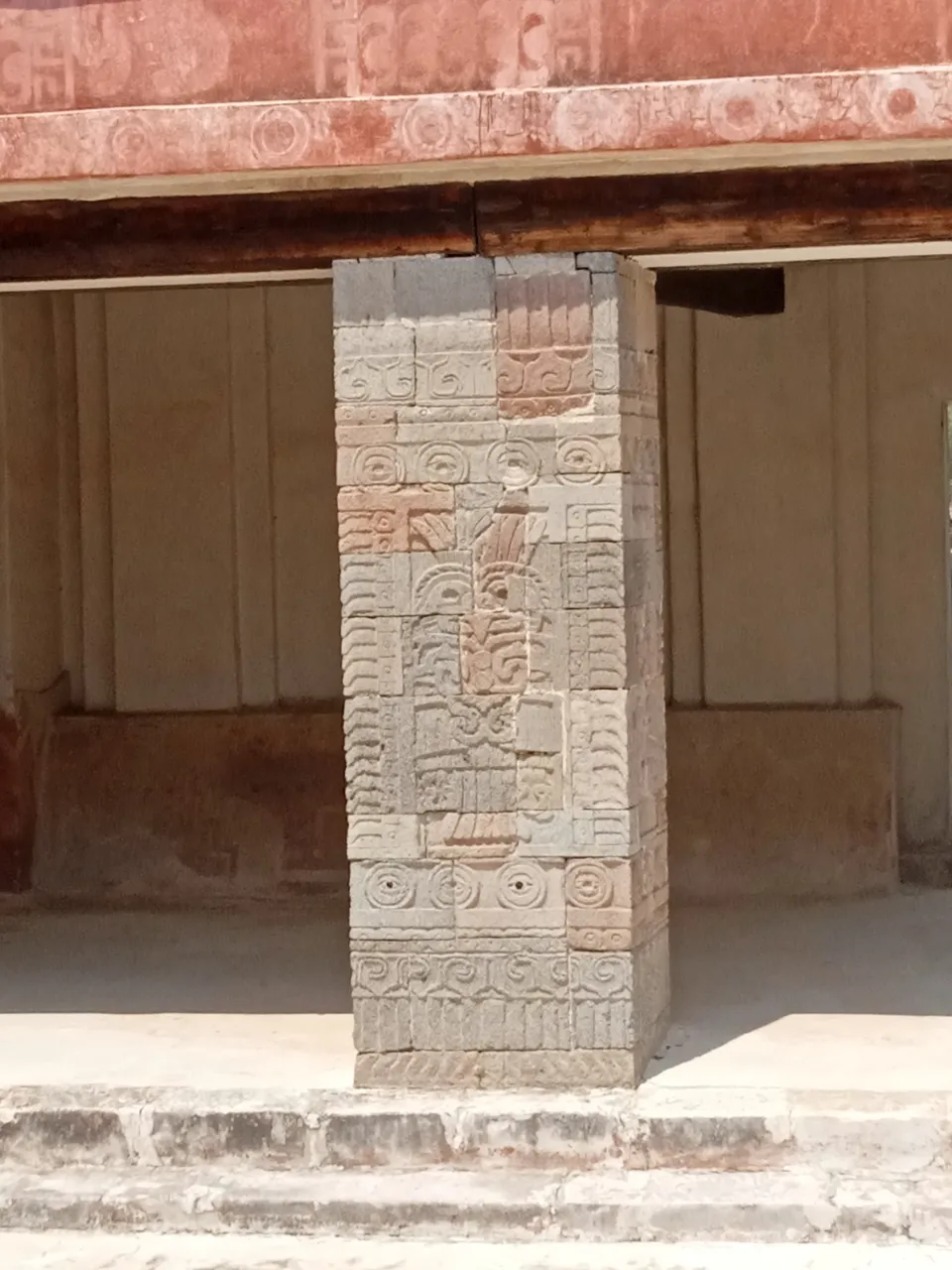

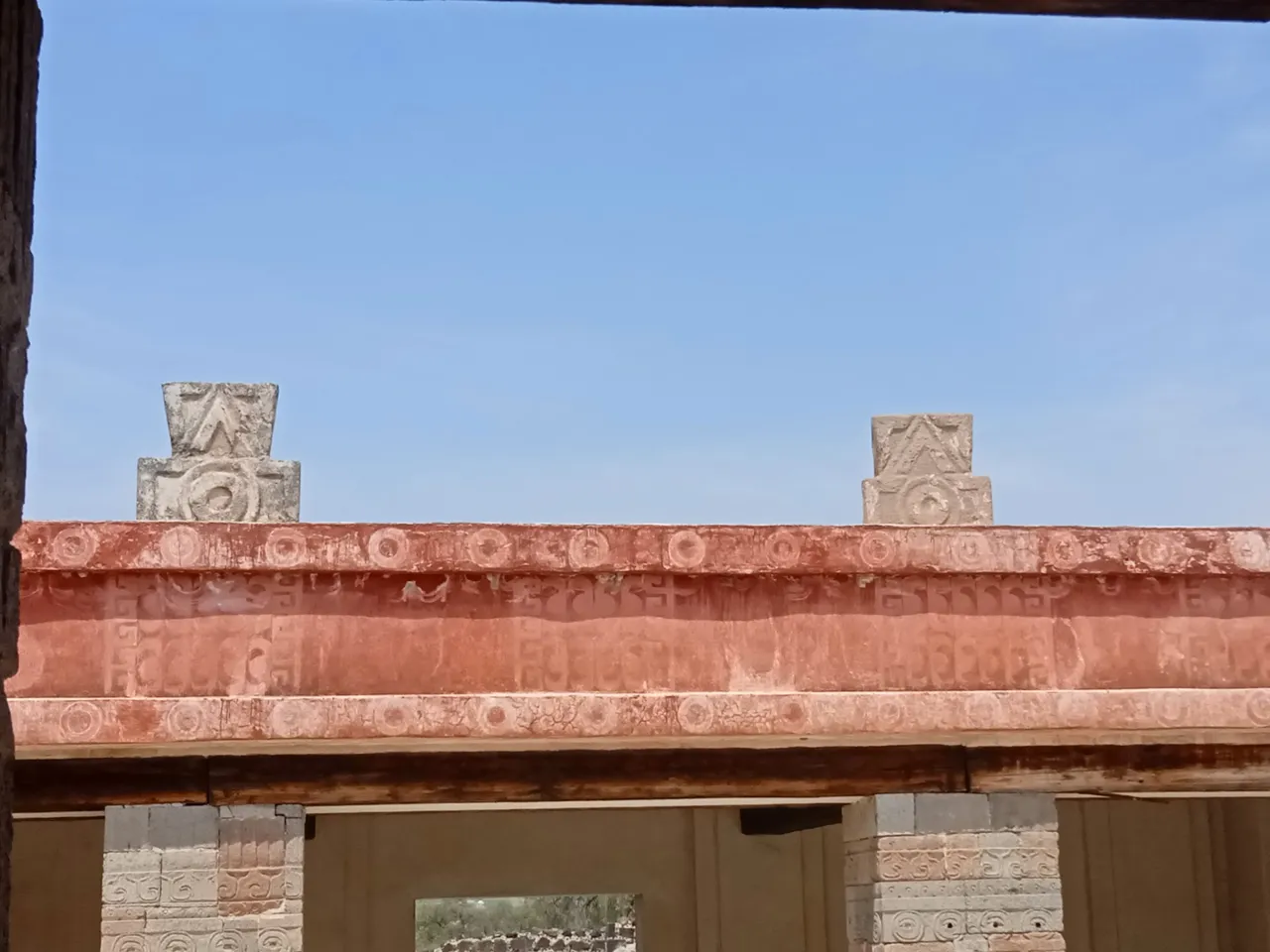
In this area there is also an underground exhibit in which stands out the preservations of the colors in the paintings that decorates the walls ant the engravings that decorates the collumns.
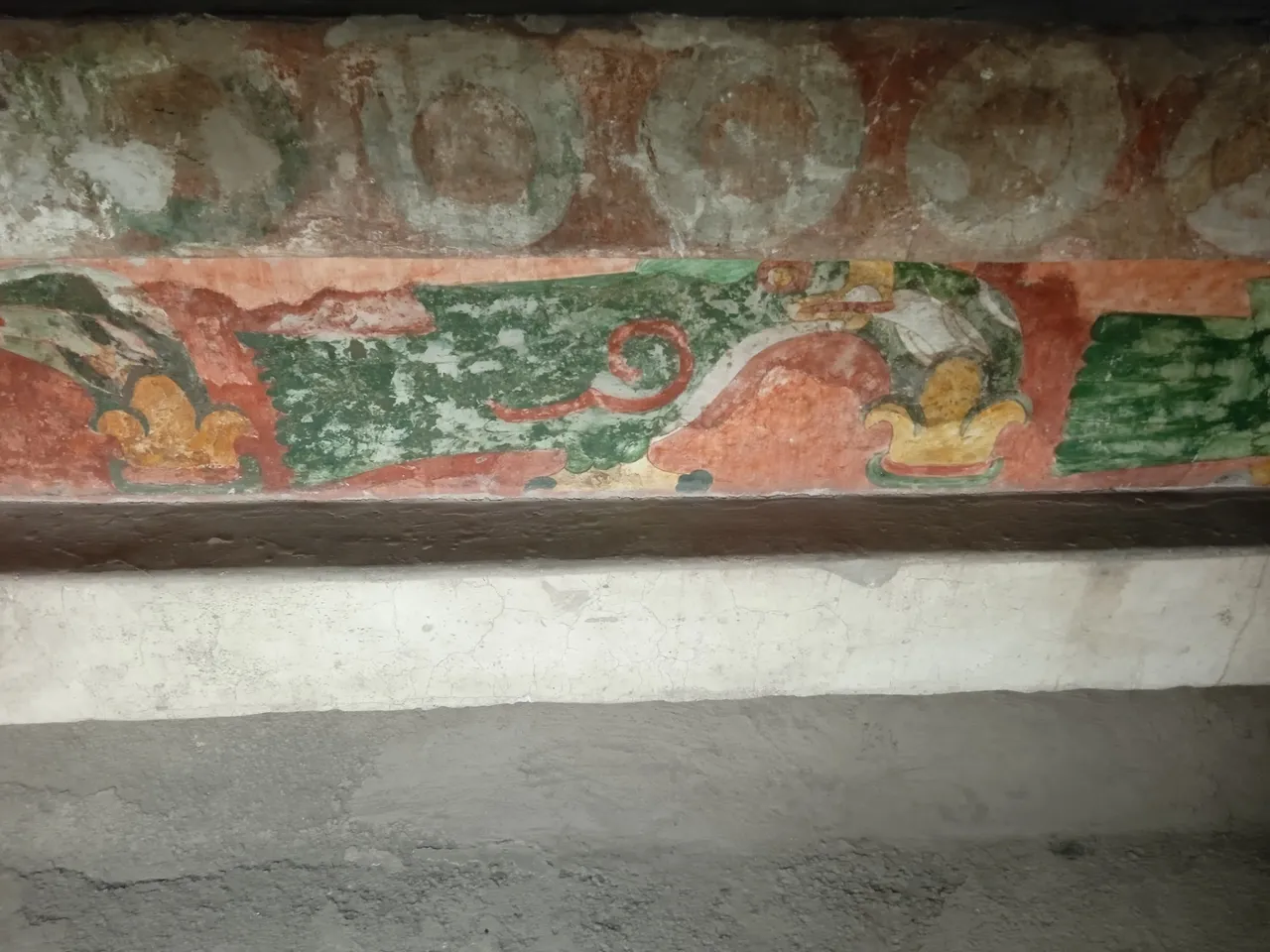

The Citadel and the Quetzalcoatl temple
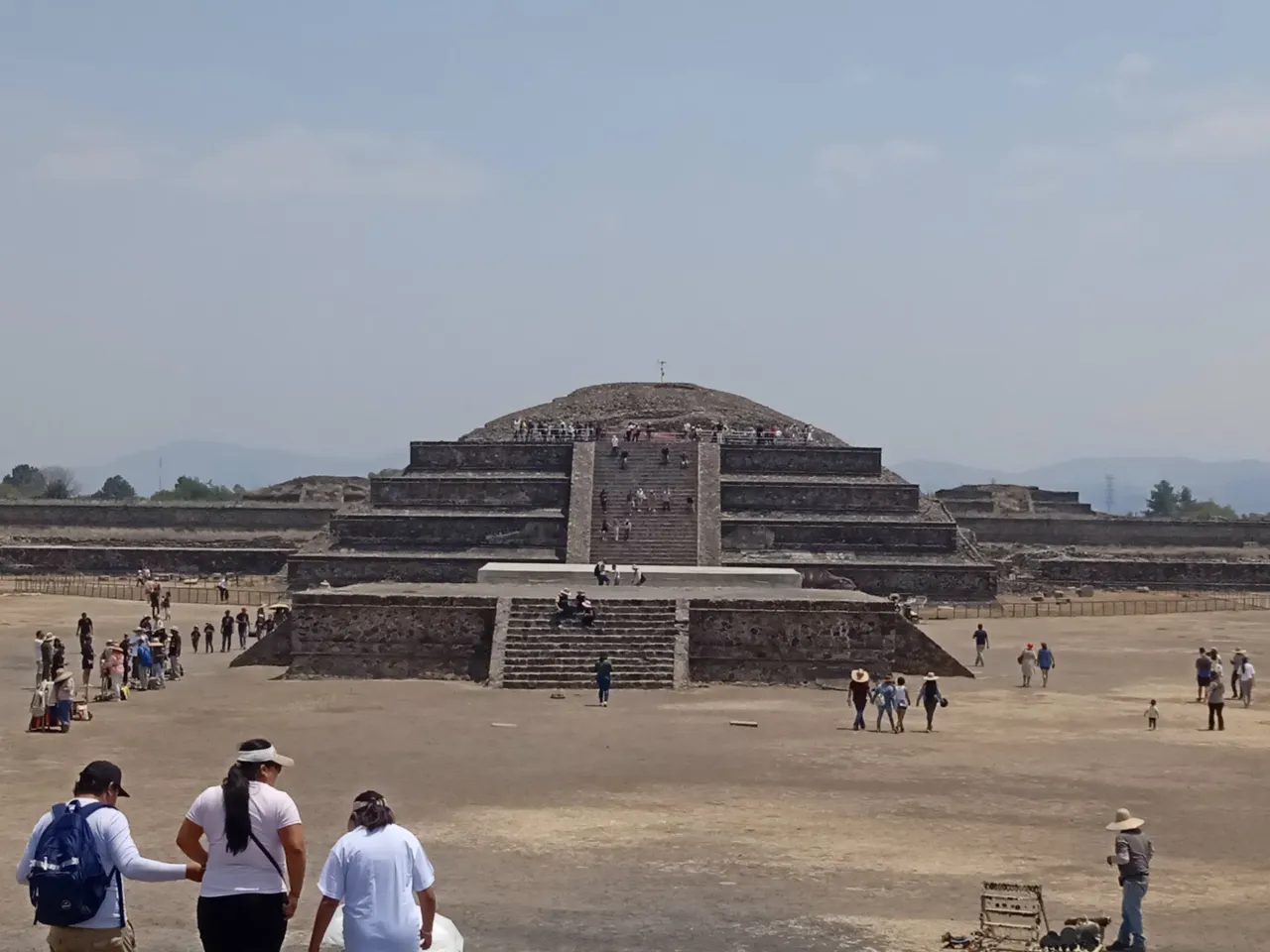
This part of the city was; according to the information posters, possibly the administrative seat of the city, it is composed by a great central terrace, surrounded by staggered platforms. At the back, the temple of Quetzalcoatl stands out and each side of the temple there are some ruins of lesser importance that form room complex possibly destinated to shelter civil servants from the citys elite.



Specifically the temple of Quetzalcoatl is in my opinion the most beautiful building in the city. In the image at the top of this section you can see some stairs and in the background a pyramid. You may think that the stairs are part of the pyramid and that climbing this stairs you can reach the top of the pyramid. But actually, this is an optical illusion since the stairs lead to a some kind of platform at the top and then there are some stairs that leads you to a narrow corridor where you can see the actual stair of the pyramid.
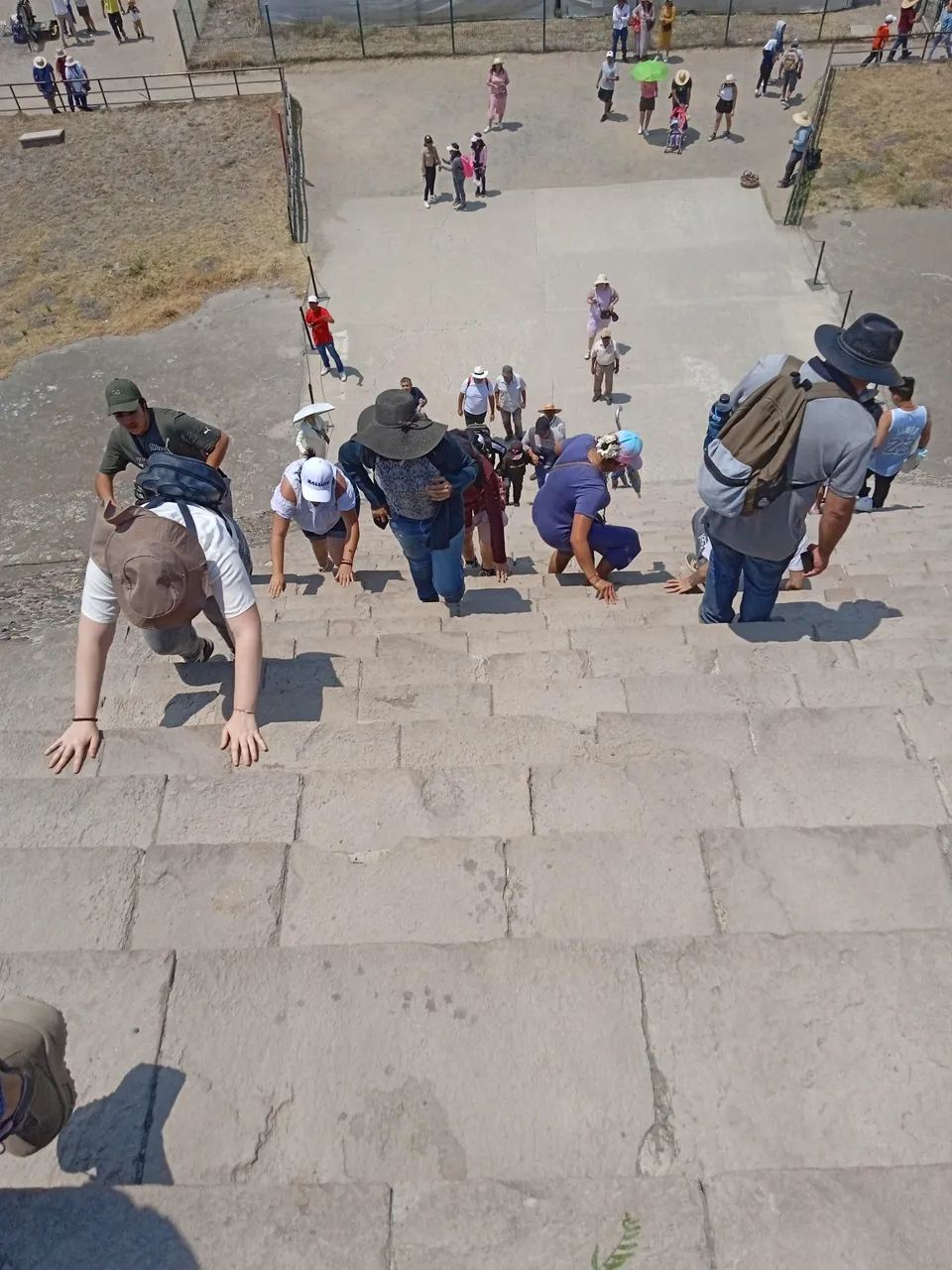
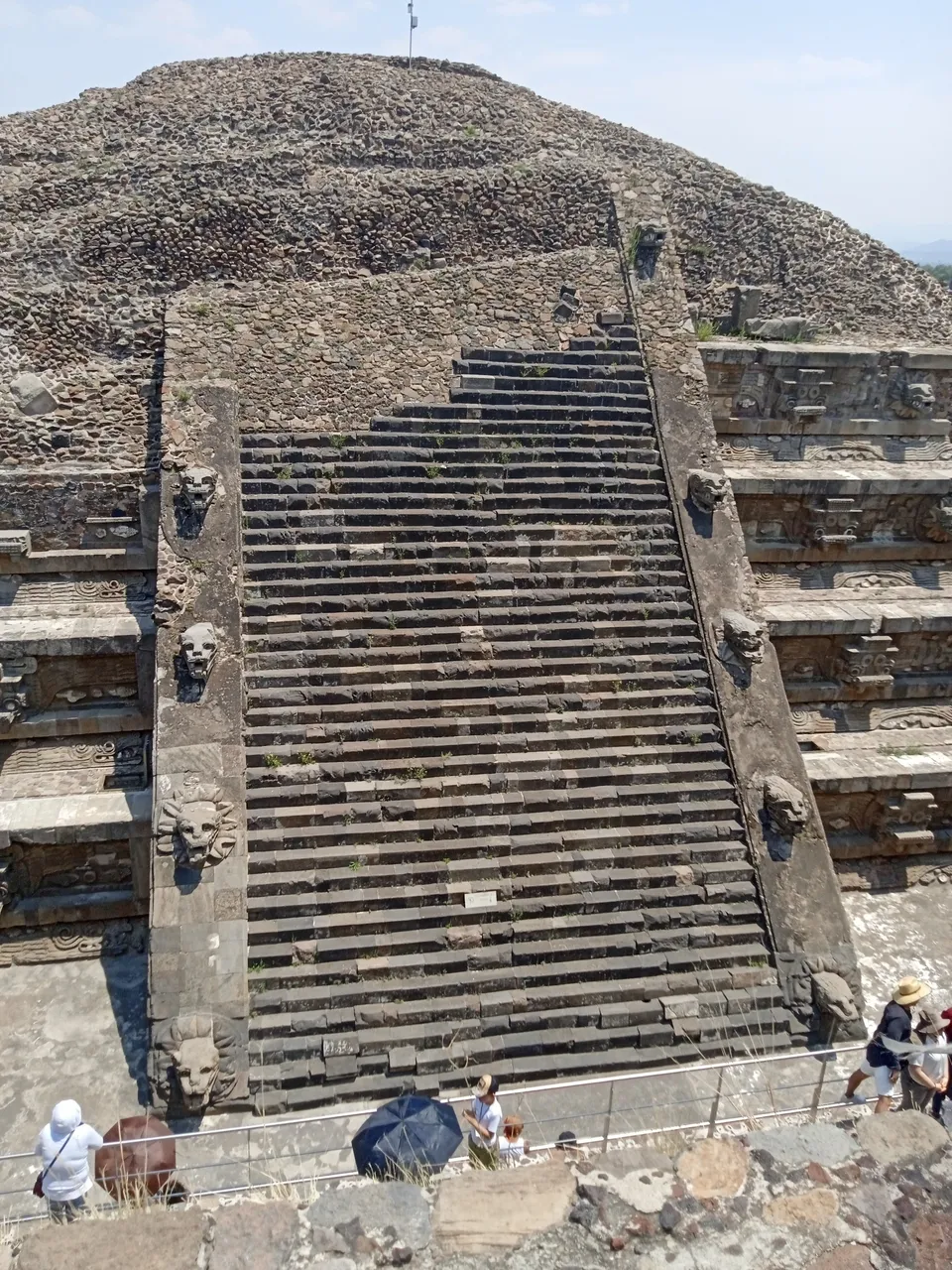
Once you reach the top of the lookout point you can see that both the stairs of the temple and its different levels are decorated with impressive stone carvings that represent different animals or mythological figures.
Its also interesting the high frecuency of carvings with form of marine shells, which demonstrate that desoite the location of the city in the central part of the continent, the people here had a close relationship with the sea.



Budget and some general advices
The place is a very beautiful one and definetely it worth the troubble of visiting, but there are some things to take into account.
Be aware that the site its prety vast, the central road alone its 4km large and there are several sites that you will want to visit, so in general you should be ready to wlak at least 5 to 8 km give or take. So wear confortable clotes and shoes.
There is little shade available and most of the visit its under the sun so protect your skin and eyes, preferably cover yourself as much as you can and use sunscreen and sunglasses. Carry anough water and keep yourself hydrated.
In the place there are a lot of vendors of artcraft and all are very beautiful, if you find something you like, don´t buy it in the fist place, walk around see other places and ask for prices. you can find the same item for even half of the price.
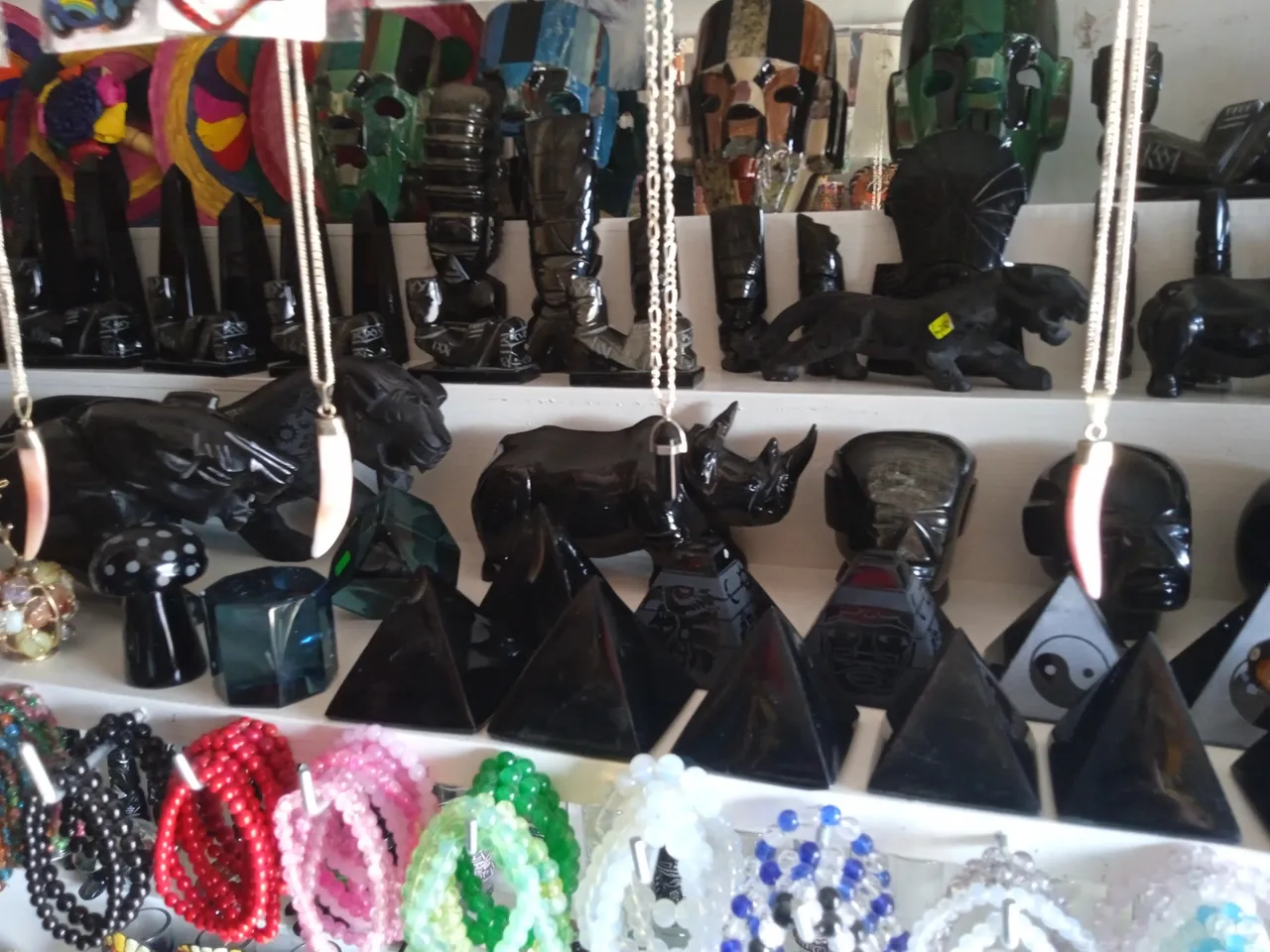
Regarding the budget you must know that there are several options of transport to the place, but if you do the trip as i did you can find its pretty low cost.
For tranportation you will need 10 MXN (0.60 USD) of subway tickets (round trip), also 136 MXN (8 USD) for bus tickets (round trip). Consider at least 40 MXN (3.40 USD) for hidration, entrance to the site is 90 MXN (5.30 USD) but be aware that if you are mexican student or retired access is free. Take money to eat. In our case we eat in a restorant at the toun of San Martín de las Pirámides (but there are offers at the gates of the site) and a meal for two people plus 1,5 L natural fruit juice cost me arround 580 MXN (35 USD aprox).
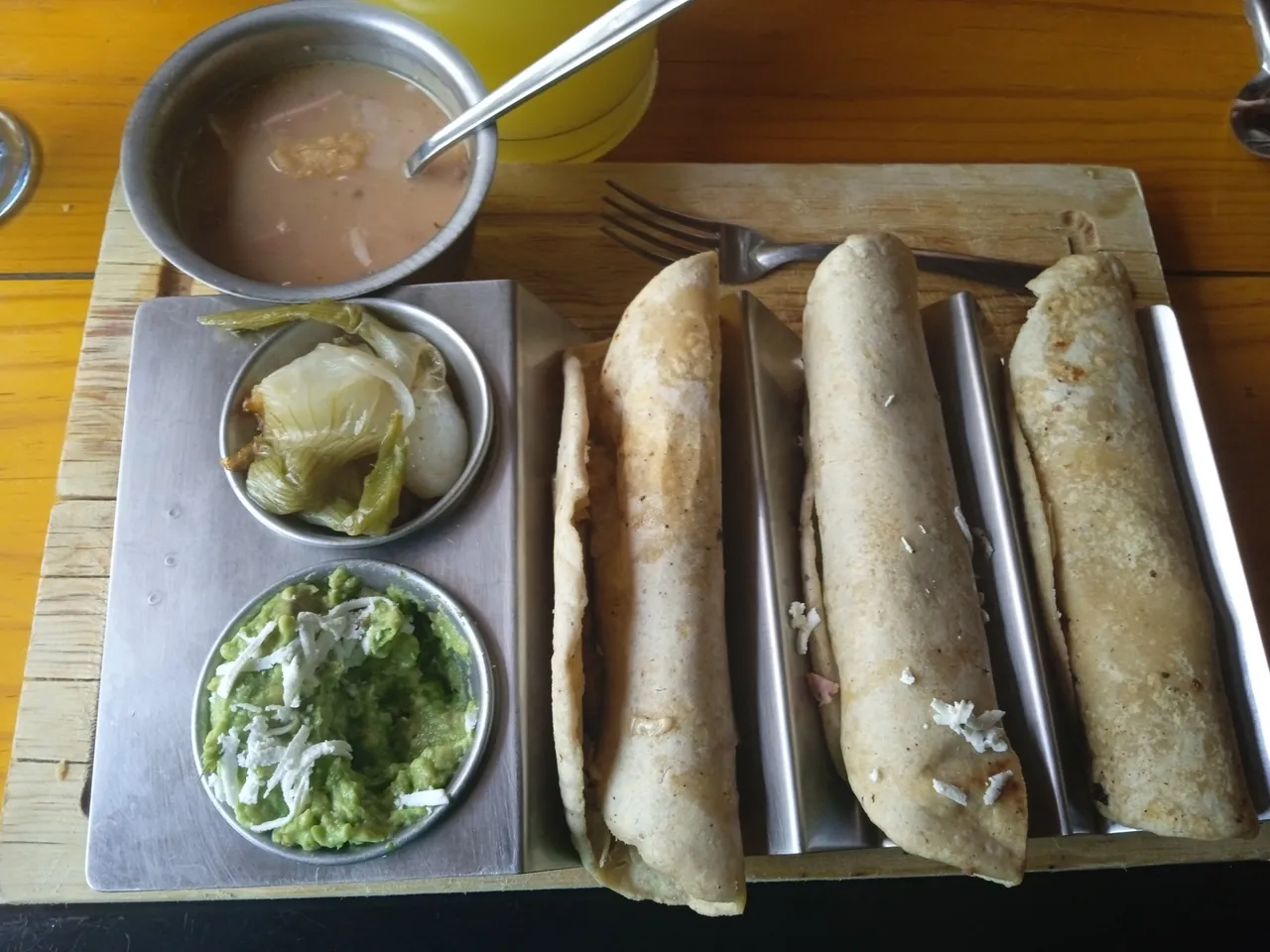
Aproximated total budget for 1 person 566.00 MXN (poco más de 33 USD).
Add in top of that money for purchase gifts and souvenirs depending of you taste and budget. and some extra money in case you want to pay for a guided visit.
Hope you found this post and advices usefull, see yah in a new adventure.
Images taken by me with my Xiaomi 9A
partially translated in Deepl
Banner designed by me in Canva

Hola Chicos
La pasada semana estuve de visita en uno de los sitios más impresionantes que he tenido la oportunidad de conocer, me refiero al sitio arqueológico de Teotihuacán en el Estado de México. Es un lugar hermoso e impactante y la visita definitivamente vale mucho la pena, pero déjenme empezar por el principio.

El viaje hasta el lugar
Como era domingo, salimos cerca de las 7am hacia la estación del metro (sí, hay otras muchas maneras de transportarse hasta el lugar, pero escogimos la más barata). Nos fuimos hasta la estación de autobuses México Norte donde compramos los tickets de autobús que nos llevaría hasta el sitio. Esta opción tienen la gran ventaja de que de una vez compras el ticket de ida y regreso. Al ser estudiantes disfrutamos un descuento del 50%, pero incluso pagando el total del valor es una opción muy barata. El viaje en general demoró 1h, 40 min y el autobus nos dejó directamente en una de las puertas de entrada de sitio arqueológico.
El Sitio
La ciudad de Teotihuacán está organizada en torno a un eje norte sur de aproximadamente 4km de largo en forma de calzada. Esta calzada es conocida por el nombre de Calzada de los Muertos.

En su extremo norte termina en la plaza de la Luna y el extremo sur no ha sido explorado aún. En su parte media se ubica la Pirámide del Sol y más al sur se encuentra el sitio conocido como "La Ciudadela" y el Palacio de Qetzalcoatl. Esta ciudad se estima que fue contruida durante el Siglo I de nuestra era, lo que significa que estas estructuras tienen unos ¡1900 años de antigüedad! Para poner un poco de contexto, esta ciudad fue construida y habitada al tiempo que los romanos eran derrotados en el bosque de Teutoburgo, o que estos mismos romanos se enfrentaban y derrotaban a la Reina Boudica y consolidaban su dominio del sur de Britania. Los teotihuacanos fueron conteporáneos de los emperadores César Augusto, Tiberio, Calígula, Claudio y Nerón.
Contrariamente a lo que se cree, los Teotíhuacanos no coexistieron con los Mexicas y la ciudad no fue construidas por estos últimos. En realidad la ciudad de Teotihuacán llevaba al menos 800 años abandonada cuando inició el auge del imperio Mexica en el valle de México. Lo que ocurre es que los Mexicas sí conocieron estas ruinas y fueron impresionados por su grandiosidad, al punto que consideraron que esta era una ciudad construida por los dioses y fueron ellos los que le pusieron el nombre que conocemos hoy y que significa en Nahuatl "El sitio de la Apoteosis". Tan fascinados estaban los Mexicas con esta cultura que en en el templo mayor de Tenochtitlán fueron encontrados objetos de la cultura Teotihuacana aparentemente trasladados por los mexicas casi un milenio despues.
La pirámide del sol

En nuestro caso entramos al sitio por la puerta ubicada justo enfrente a la pirámide del sol, esta es una ubicación privilegiada, pues la primera imagen que recibes del sitio es la de una de las mayores pirámides de mesoamérica, una imponente masa de roca que se alza hasta los 65m de altura y que domina el centro de la ciudad. De acuerdo con la información turística del lugar, aunque se conoce con el nombre de "Pirámide del Sol" los ultimos hallazgos arqueológicos apuntan a que probablemente era un templo dedicado a la adoración del dios del agua (Tláloc para los Mexicas). En tiempos pasados se podía subir hasta la cima de la pirámide, pero en este momento ya no está permitido. La base de la pirámide está adornada con tallas en piedra que representas figuras circulares y cabezas de animales.
El complejo en los alrededores de la pirámide cuenta además con varias plataformas escalonadas y varios complejos habitacionales contruidos en piedra.






La plaza de la Luna

En mi criterio este es el lugar más impresionante del todo el sitio, aunque la pirámide de la luna no es tan grande e imponente como la del sol, aún es una estructura magnífica. Lo que hace muy impresionante este lugar para mí es que no es solo una pirámide, sino todo un complejo que incluye además varias plataformas escalonadas de menor tamaño y un palacio organizados alrededor de una gran plaza central. Posiblemente este sitio albergó los grandes eventos políticos y religiosos de la ciudad hace casi 2000 años. Cuando se observa con detenimiento casi se puede imaginar a los teotihuacanos ocupando los diferentes escalones de las plataformas secundarias, a los líderes de la ciudad presidiendo todo desde la plataforma de la pirámide de la luna y algún tipo de ritual siendo ejecutado en la plataforma central de la plaza, todo mientras se ejecutaba algún tipo de canto o música litúrgica. Estando en ese lugar todo lo que hace falta es un mínimo de imaginación para transportarse al pasado lejano.
El Palacio de Quetzalpapalotl

El nombre de este palacio significa "Mariposa Hermosa" y era posiblemente el hogar de la realeza teotihuacana. Aunque no se conserva del todo y el acceso es bastante restringido, existen varios elementos destacables del palacio.
Las columnas que rodean el patio central cuentan con finas y muy hermosas tallas que adornan el lugar, almenas de piedra tallada que han sobrevivido milenios y dinteles de piedra ornamentados con pinturas de color rojo (posiblemente grana cochinilla) que aún se conservan.




Es esta zona del sitio arqueológico hay también un área de exhibición subterranea, en la que destaca la conservación de los coleres de las pinturas que adornan parte de las paredes, y las tallas que adornan las columnas.


La ciudadela y el templo de Quetzalcoatl

Esta parte del complejo, de acuerdo con la información a los visitantes, era posiblemente la sede administrativa de la ciudad, está compuesta por una explanada central rodeada de plataformas escalonadas, al fondo destaca el templo de Quetzalcoatl y a cada lado del templo hay ubicadas ruinas de menos importancia que conforman complejos habitacionales posiblemente destinados a albergar funcionarios de la élite de la ciudad.



Específicamente el templo de Quetzalcoatl es en mi opinión la construcción más bella de todo el sitio arqueológico. En la imagen que se encuentra al inicio de esta sección se observa una escalinata y al fondo una pirámide. Da la impresión de que la escalinata forma parte de la pirámide y que es posible acceder a la cima de la misma a través de ella, pero esto es en realidad una ilusión óptica, pues la escalinata tien su propia cima y del otro lado escaleras que descienden a un espacio en forma de pasillo estrecho que da acceso a la verdadera escalinata de la pirámide.


Una vez se alcanza la cima del mirador se puede ver que tanto la escalinata del templo, como sus diferentes niveles están adornados con tallas hermosas, que representan diferentes animales o figuras mitológicas.
Además llama la atención la alta frecuencia de tallas con forma de conchas marinas, lo que demuestra que a pesar de que la ciudad se encuentra en el centro del continente, los teotihuacanos tenías estracha relación con el mar.



Presupuesto y algunos consejos generales
El lugar es un sitio de gran hermosura y definitivamente vale mucho la pena la visita, pero hay algunas cosas que debes tener en cuenta.
Ten presente que el sitio en su totalidad es bastante extenso, la calzada solamente cuenta con 4km de longitud y cuenta con varios sitios y complejos de construcciones que merece la pena recorrer de manera que en general debes estar preprarado para caminar de 5 a 8 kilómetros aproximadamente. Así que lleva ropa y zapatos cómodos.
Hay muy poca sombra disponible, la mayor parte del recorrido se hace bajo el sol, así que protege tu piel y tu ojos, es recomendable recubrir la mayor parte de la pier que puedas, ponerte bloqueador solar y usar lentes de sol. Carga suficiente agua y manténte hidratado todo el tiempo.
En el sitio hay infinidad de puestos de venta de artesanías todas interesantes y muy hermosas, si algo te interesa como souvenir camina y pregunta, nunca compres la primera oferta, puedes encotrar cosas incluso a mitad de precio en otros puestos.

En cuanto al presupuesto debes conocer que hay variadas ofertas de transporte hasta el sitio, pero si haces el recorrido tal cual lo hice yo puedes llegar con un precio bastante bajo.
Para trasportación necesitarás 10 MXN (0.60 USD) de tarifa del metro (ida y regreso), además 136 MXN (8 USD) para la tarifa del bus (Ida hasta el sitio y regreso). Considera al menos 40 MXN (3.40 USD) para mantenerte hidratado, la entrada al sitio cuesta 90 MXN (5.30 USD) pero considera que si eres estudiante o jubilado mexicano la entrada es gratis. Debes tener en cuenta también fondos para la comida pues de seguro tendrás que comer en el sitio. En nuestro caso fuimos a comer a un restaurant en el pueblo de San Martín de las Pirámides (pero hay ofertas más cercanas a las puertas de acceso al sitio) y una comida para dos personas + 1,5 L de jugo de fruta natural puedes adquirirlo por alrededor de 580 MXN (35 USD aprox).

Total aproximado para 1 persona 566.00 MXN (poco más de 33 USD).
Además considera presupuesto para la compra de regalos y souvenirs y si te interesa también para pagar por una visita guiada, pero eso ya dependerá de los gustos y deseos de cada quien.
Espero que les haya sido de utilidad el post y las recomendaciones, nos vemos en una nueva aventura.
Imagenes tomadas por mí con mi Xiaomi 9A
Traducido parcialmente en Deepl
separador diseñado por mi en Canva